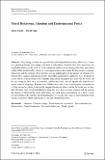Files in this item
Moral behaviour, altruism and environmental policy
Item metadata
| dc.contributor.author | Daube, Marc Philip Klaus | |
| dc.contributor.author | Ulph, David Tregear | |
| dc.date.accessioned | 2014-10-28T16:31:01Z | |
| dc.date.available | 2014-10-28T16:31:01Z | |
| dc.date.issued | 2016-02 | |
| dc.identifier | 94835540 | |
| dc.identifier | f2f96179-1092-4e8c-b7f2-02884719e28c | |
| dc.identifier | 84957848281 | |
| dc.identifier | 000369314800015 | |
| dc.identifier.citation | Daube , M P K & Ulph , D T 2016 , ' Moral behaviour, altruism and environmental policy ' , Environmental and Resource Economics , vol. 63 , no. 2 , pp. 505-522 . https://doi.org/10.1007/s10640-014-9836-2 | en |
| dc.identifier.issn | 0924-6460 | |
| dc.identifier.other | ORCID: /0000-0003-3171-1270/work/59464519 | |
| dc.identifier.uri | https://hdl.handle.net/10023/5577 | |
| dc.description | Marc Daube gratefully acknowledges financial support from the Economic and Social Research Council, grant number ES/J500136/1 | en |
| dc.description.abstract | Free-riding is often associated with self-interested behaviour. However if there is a global mixed pollutant, free-riding will arise if individuals calculate that their emissions are negligible relative to the total, so total emissions and hence any damage that they and others suffer will be unaffected by whatever consumption choice they make. In this context consumer behaviour and the optimal environmental tax are independent of the degree of altruism. For behaviour to change, individuals need to make their decisions in a different way. We propose a new theory of moral behaviour whereby individuals recognise that they will be worse off by not acting in their own self-interest, and balance this cost off against the hypothetical moral value of adopting a Kantian form of behaviour, that is by calculating the consequences of their action by asking what would happen if everyone else acted in the same way as they did. We show that: (a) if individuals behave this way, then altruism matters and the greater the degree of altruism the more individuals cut back their consumption of a ’dirty’ good; (b) nevertheless the optimal environmental tax is exactly the same as that emerging from classical analysis where individuals act in self-interested fashion. | |
| dc.format.extent | 18 | |
| dc.format.extent | 285059 | |
| dc.language.iso | eng | |
| dc.relation.ispartof | Environmental and Resource Economics | en |
| dc.subject | Altruism | en |
| dc.subject | Climate change | en |
| dc.subject | Environmental Tax | en |
| dc.subject | Externalities | en |
| dc.subject | Moral Behaviour | en |
| dc.subject | Pro-social behavior | en |
| dc.subject | Public goods | en |
| dc.subject | HB Economic Theory | en |
| dc.subject | Economics, Econometrics and Finance(all) | en |
| dc.subject | BDC | en |
| dc.subject | R2C | en |
| dc.subject | SDG 12 - Responsible Consumption and Production | en |
| dc.subject | SDG 13 - Climate Action | en |
| dc.subject.lcc | HB | en |
| dc.title | Moral behaviour, altruism and environmental policy | en |
| dc.type | Journal article | en |
| dc.contributor.institution | University of St Andrews. School of Economics and Finance | en |
| dc.identifier.doi | 10.1007/s10640-014-9836-2 | |
| dc.description.status | Peer reviewed | en |
This item appears in the following Collection(s)
Items in the St Andrews Research Repository are protected by copyright, with all rights reserved, unless otherwise indicated.

